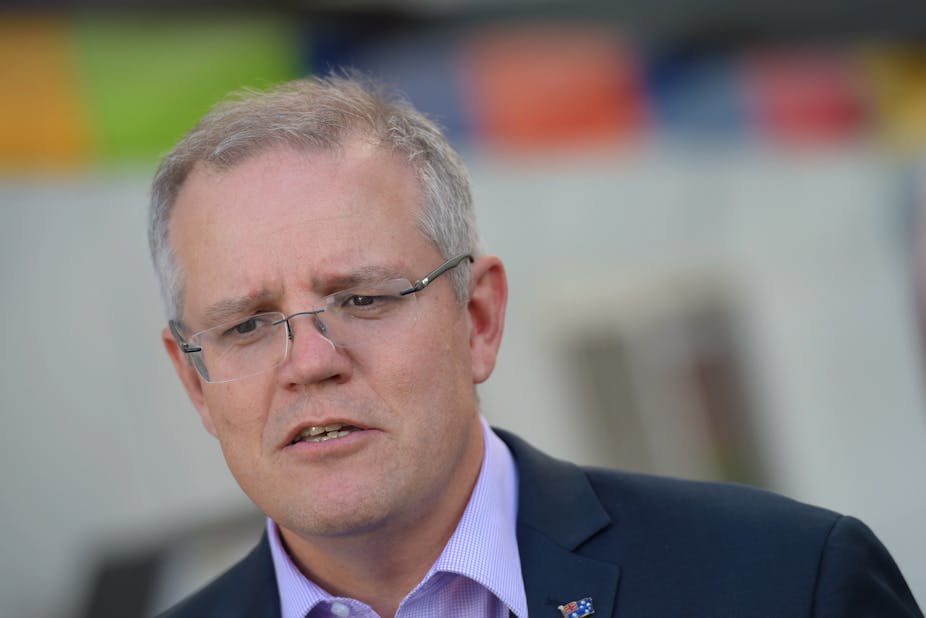Social Services minister Scott Morrison has unveiled the first part of the Abbott government’s “families package” ahead of next month’s federal budget and the signs are not good.
With the announcement of a $246 million two year pilot nanny subsidy program for low to middle income families, Morrison is signalling clearly he is willing to breach an implicit but long-term rule of public subsidies for child care - that is, that this service is regulated to ensure quality care.
Since funding started in 1972, subsidies have supported the costs of appropriately qualified staff. Morrison’s announced scheme will break this rule by subsidising sole carers over 18 with a first aid certificate. These carers will work alone with children in their own home, with no requirements for training or supervision.
This program includes children with special needs, in isolated areas, and babies, not just someone who picks up school age children and feeds them afternoon tea till mother comes home. They may take on two or three children, given the estimate is for more than twice as many children as carers.
The scheme is promoted to appear socially desirable, as it claims to fund care services for those who work antisocial hours to meet our needs. Their shifts often fall outside the usual hours of child care services which usually only operate between 6.30am to 6.30pm, and have often rotating rosters, making care services difficult to sustain.
However, rather than the government working with existing services, such as family day care or even centre based services, to set up outreach or greater flexibility of use, the government has set up a new service without any quality guarantees or controls. The government focuses on “parental choices” to justify their lack any quality controls.
This is apparent in a couple of odd statements from Morrison.
“Nannies are not meant to replace mainstream childcare services but we want families to be able to choose the care type that suits them best, including using nannies in addition to other childcare,” Mr Morrison told The Daily Telegraph. This suggests that if families want their kids to have developmental activities and skilled care, they should be prepared to paying for two different types of services.
Later in an ABC AM interview, Morrison explained why the nanny carers needed no qualifications.
Well, because we’re talking about a different type of service. I mean in many cases with shift workers we’re talking about a nanny who’s there overnight…. they won’t be doing too much learning in the middle of the night. And so it’s a different type of service. It’s not a mainstream service. And if parents want to engage someone with an early childhood qualification, well of course they can. But we’re going to leave that choice up to the parents.
All this ignores the other times these workers are likely to cover.
Parents who want qualified carers will just have to pay more themselves as there will be the same subsidy for qualified and unqualified carers.
This raises the question of the level of subsidy available vis a vis what carers will need to be paid. It will be means tested, but even the top rate is likely to fall well short of the costs of care workers. The usual rates, according to various online providers, would be between $22 and $30 per hour. So an eight hour shift, either all day or overnight, would cost say $200 and that doesn’t allow travel time.
The proposed Productivity Commission’s possible hourly subsidy was less than $8 per hour, which is an indicator of median costs of group care. Were even $10 per hour to be offered, it still leaves a gap of maybe $15 per hour - which is not really affordable for lower paid workers like nurses or aged carers, and particularly for single parents.
The total figures proposed don’t add up either. Morrison quotes targets of 10,000 children and 4000 nannies, which suggests most families would have two children in care. However, if these are annual totals, the allocated $125 million per annum would offer an average of $12,500 average subsidy per child in care,($250 per week,) or an allocation of $31,250 per carer.
As an all up cost this is very marginal as it would have to cover on costs including recruitment, administration, insurance - let alone super and sick pay. Over the two years, it doesn’t seem nearly enough!
Were this an exercise for students on good policy drafting, I’d give the Minister a fail. He is undermining the rights of children to quality care, risking the work exploitation of the women who are potential carers and, most seriously, taking the lazy way out of fixing the inadequacies of the over-marketised care suppliers.
Children’s services should be planned and directly funded to offer much more flexible services with well supervised and qualified staff! The children deserve better.

